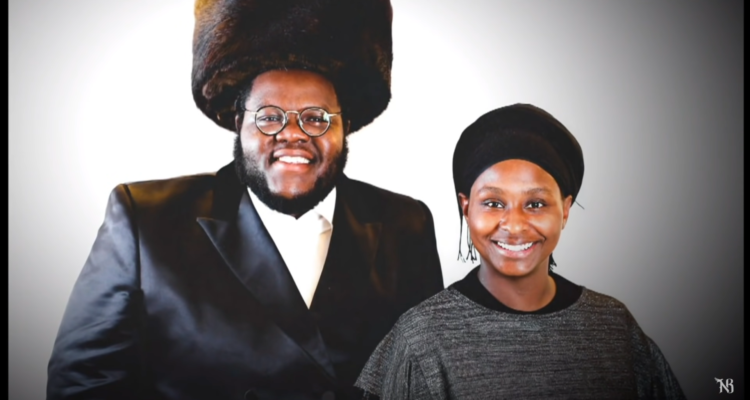Born into an African-American Muslim family, this American-Israeli rapper’s journey to Orthodox Judaism is incredible.
By World Israel News Staff
In many ways, Nissim Black’s life is typical for an American immigrant to Israel. He lives in Beit Shemesh, a religiously observant Jerusalem suburb with a substantial English-speaking population, with his wife Adina and six children.
In his Hasidic garb and eyeglasses, he certainly looks the part of an Orthodox Jew that’s devoted to his faith. But Black’s journey to Judaism didn’t begin by being born into a Jewish family in the Orthodox enclaves of Crown Heights in New York or Pico Robertson in Los Angeles.
He was born as Damian Jamohl Black in the Seward Park neighrbohood of Seattle, to African-American Muslim parents, rappers Mia Black and James “Captain Crunch” Croone. His parents divorced when he was young and his mother and step-father dabbled in criminal activity, including drug dealing.
An FBI raid on his childhood home preceded his mother dying of a drug overdose at the age of 37. Black struggled to cope with the chaos and lack of structure.
“I was going through troubled times as a kid, I had joined a gang, I was smoking every single day, I was expelled from the Seattle school district…and I was twelve, thirteen years old,” he told Arutz Sheva.
Searching for truth
Looking for an answer, Black spent time exploring his parents’ his Muslim faith, which was heavily influenced by the Nation of Islam sect. Later, he participated in activities at a Christian youth center, which led him to convert to Christianity.
“Being in a gang…was a part of me trying to say, ‘I belong to something greater than myself, I don’t know where, but I belong somewhere,’” Black told Chabad.org.
Black eventually turned his life around by focusing on his lifelong passion for music. Rapping under the name “Danger,” he released music videos which were featured on MTV and performed at major concerts.
But despite his rising music career, Black felt there was something missing. He told Chabad that he was primarily motivated by an “innate search for truth.”
“Since I was a kid, I was digging to find the root of everything. I think it was programmed into me to search for the truth.”
Coming home
Eventually, Black began reading Jewish texts and researching Judaism on Chabad.org. His research eventually led to an Orthodox conversion facilitated by Rabbi Simon Benzaquen at the Sephardic Bikur Holim Congregation in Seattle.
His wife, whom he civilly married in 2008, converted as well, and the two were re-married according to Jewish law in 2013.
In 2016, the Black family moved to Beit Shemesh. Since becoming Jewish, Black has shunned secular hip-hop music that glorifies drugs and violence. But that doesn’t mean he’s stopped making music.
“Nissim recognized that G‑d gave him a gift, his musical talent,” Rabbi Yochanon Goldman told Chabad.
“Rather than run away from it because it would remind him of his past, he has found a way to elevate the genre of hip-hop music by using this gift to inspire others with messages of positivity and joy.”
Since revamping his music to promote a spiritual message, Black has partnered with Jewish singers like Gad Elbaz and his videos on YouTube have racked up millions of views. And when asked if his passion for Judaism is waring off nearly ten years after his incredible transformation, Black laughed off the question.
“You come into Judaism with fire,” he said, describing his zeal for his faith. “Everybody else who’s frum [observant] from birth, they don’t take it as serious.”





